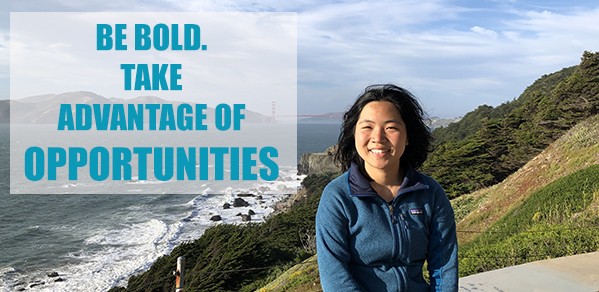
It was during time spent volunteering as an aquarist, that Amy Jin became interested in how complex mechanisms in nature could be used to generate innovative human health solutions. As she prepares for a PhD in Engineering this October, we caught up with Amy to find out more about her forthcoming research in the field of bioelectronics.
Taking cues from nature’s engineering to generate innovative human health solutions is a powerful approach that I am excited to explore further through my research at Cambridge.
Amy Jin
I grew up fascinated with animals and ecology. Working at a science museum previously and volunteering as an aquarist exposed me to the existing complexity of life’s mechanisms, for instance, the electric eel is essentially a living battery!
I have always admired the incredible resilience, adaptability and complexity of life. While studying Biological Engineering and Electrical Engineering and Computer Science at MIT – Massachusetts Institute of Technology, I started to think of nature itself as a master engineer, spending billions of years perfecting the mechanisms that have sustained life, and about how we can utilise all these existing complex mechanisms in nature to help people. Taking cues from nature’s engineering to generate innovative human health solutions is a powerful approach that I am excited to explore further through my research at Cambridge.
For my research in bioelectronics, I plan to develop medical technology for targeted drug delivery to the brain. This approach opens up a myriad of applications – improving treatment for brain cancers, epilepsy, multiple sclerosis and neurodegenerative diseases.
Studying at Cambridge allows me to perform research with some of the top experts in Biological Engineering, Electrical Engineering, and many other fields, in an interdisciplinary environment. I also have the great opportunity to collaborate with clinicians in working on translational medical research. I am inspired by our constantly evolving approaches to developing technology and I hope that I can contribute in some way to find solutions and address existing gaps in medicine.
Be bold and take advantage of opportunities, whether they fit the original vision or not – this is my advice for those who are looking to study Engineering. I often face self-doubt, and realising that others, even world experts, feel the same way, has helped me feel freer to pursue a variety of interests. I think giving myself the chance to explore and find my own path was helpful in building confidence in my choices.
About the Gates Cambridge class of 2021
This year’s cohort comprises 74 new scholars. They will be joined by 10 scholars who are deferring from 2020. The 84 scholars, who come from 30 countries, will begin their studies in October. The class comprises 42 women, 31 men and one non-binary scholar. The Gates Cambridge scholarship programme, which this year celebrates its 20th anniversary, is the University of Cambridge’s leading international postgraduate scholarship programme.

